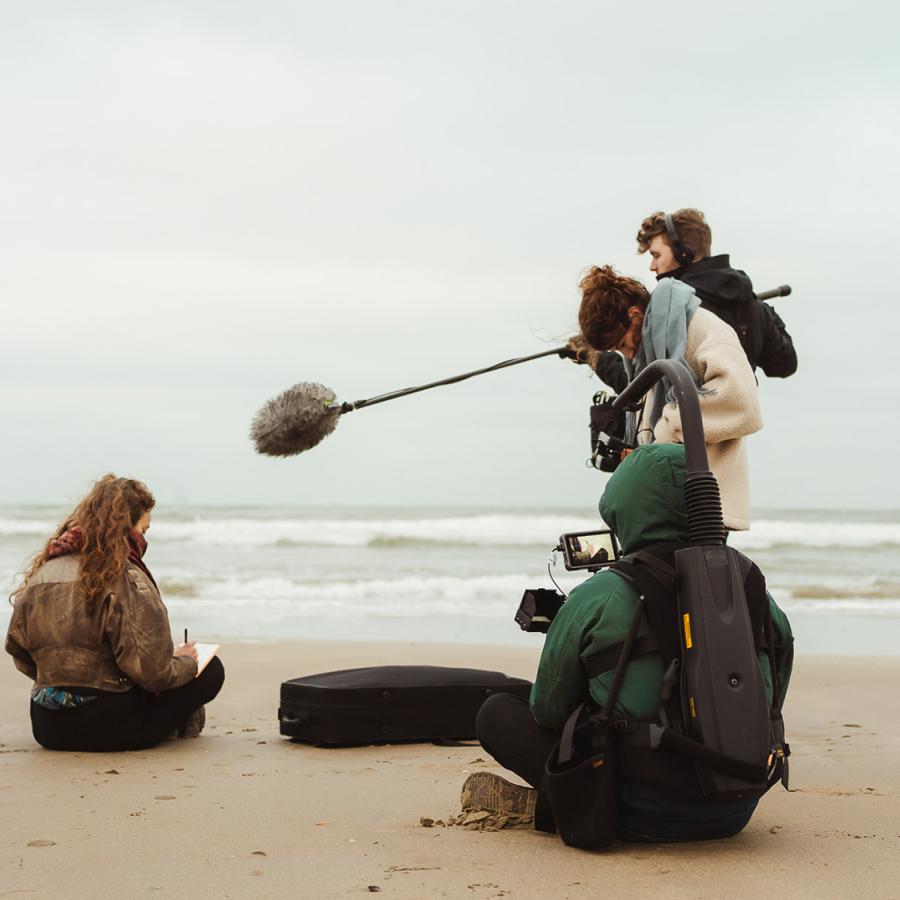Dr Amy Hardie

Job title:
Senior Lecturer
Role:
FilmMedicine Director, Film Directing
Office:
Hunter Building, Room L27
Research Output:
Edinburgh Research Explorer linkBiography
Dr Amy Hardie graduated from the National Film and Television School with the BP Expo prize for best student documentary (Kafi’s Story). Her debut feature The Edge of Dreaming was the first Scottish feature documentary to be selected for competition at IDFA in 2009 and was awarded the Grand Jury Prize, Kiev International Film Festival, generating over 250 interviews on radio, television and print. After a science feature, Stem Cell Revolutions , she made the innovative Seven Songs for a Long Life (2015), a documentary in Song on palliative care. Her films have won 13 awards, translated into 14 languages and are shown in 16 countries including on POV in the US.
Research interests include collaborative work with scientists and health professionals, policy makers and new technologies. She directed 6 films with the Centre for regenerative medicine, including Stem Cell Revolutions (Best Documentary Milan), funded by the Wellcome Trust.
Outreach and impact is integral to each of Hardie's projects, and the Research group and PG course FilmMedicine explore documentary’s capacity to make change beyond the academy. She received the Tam Dalyell medal (with Prof Clare Blackburn) for public engagement with science. FilmMedicine intersects with science communication, health humanities and creative documentary practice, bringing a fresh and creative perspective to documentary form and developing a sophisticated cross-disciplinary approach with therapeutic intent. She is currently developing a VR app for well-being with support from the Wellcome Institute. She works closely with the Schools of Health in Social Sciences; Medicine, Veterinary Medicine, the NHS, Palliative Care, Trauma Scotland and the Scottish Parliament.
She is currently completing filming on HorseMen, a feature documentary funded by British Film Institute and Creative Scotland , exploring the brain biology of trauma; the impact horses can have on veterans, and the long route to recovery after losing everything.
Dr Amy Hardie is an accessible teacher with 12 years experience directing documentaries for BBC and Ch4, and four cinematic feature documentaries with international funding and distribution. She supervises PhD, MFA and MA students within film and television at eca, and FilmMedicine and Health Humanities Students within the larger University framework. She is particularly interested in the intersections between science, humanities and creative practice, and encourages an innovative cross-disciplinary approach to each individual student, discovering the unique creative form needed to express and explore their research questions. Her practical experience in sound recording, camerawork, and editing, as well as directing and producing, makes her able to suggest solutions to most story-telling problems. She is currently making her first VR app, and looks forward to introducing new technologies to her FilmMedicine students.
Hardie’s students are encouraged to come to their course with a research question in the form of an idea for a documentary. Current and past student projects include turning academic health research into music videos for teenagers; an immersive documentary showing epilepsy from the inside; an ethnographic film on death and food, and an exploration into medical student’s creativity. Hardie often continues to mentor her students after graduation, acting as story supervisor for shorts and feature films, i.e. on a comic book writer’s attempt to express his brain tumour.
Dr Hardie’s own research projects, on documentary and trauma; palliative care; and dreams and the body, attract high calibre international students. With her students, she is defining and contextualising FilmMedicine: a creative research group making documentaries with therapeutic intent, closely engaged with the public they serve, and often innovative in form and structure. These projects are embedded in the wider community, and often have a substantial impact on families, patients, policy-makers and health professionals.
Research
Research
Documentary storytelling creates emotional and intellectual journeys for audiences. Its tools are image and sound, and its raw materials are all of human behaviour. Dr Amy Hardie is interested in creating a visual language to explore what and how we know – from the verifiable proofs of science, to the evocation of dreams and archetypes. In her research area, FilmMedicine, she harnesses those tools to create work with therapeutic goals or therapeutic intent.
The scope and timescale of documentaries often allow us to engage with a person or situation over years, allowing transformation to structure a narrative that is unscripted yet profoundly satisfying. Dr Hardie’s feature documentaries have been screened extensively in over 40 countries, translated into 14 languages and are seen in cinemas, festivals, and international broadcasters in every continent. She a strong interest in collaborative creativity, developing features and shorts with stem cell scientists, neurologists, the hospice movement, Maggie’s Centres, and now with military veterans with PTSD.
This research has been funded by The British Film Institute, Creative Scotland, Wellcome Trust, Hartley Foundation and rewarded with 14 international awards, and nominations, from a Joris Ivens award to the University Tam Dalyell medal for public engagement with science. As a working film-maker, Dr Hardie is committed to research by practice, and this passion for research is the basis of her teaching. She encourages her students and alumni to recognise that documentary is a form of art alive with potential. As Bunuel said:
“A film is like an involuntary imitation of a dream…On the screen, as within the human being, the nocturnal voyage into the unconscious begins…The cinema seems to have been invented to express the life of the subconscious, the roots of which penetrate poetry so deeply. Yet it is almost never used to do this ".
Current PhD students
On Homing. Exploring belonging between cultures through film and writing.
PhD Supervision Topics
- FilmMedicine
- First person documentaries
- Health and well-being
- Pyschoanalysis


